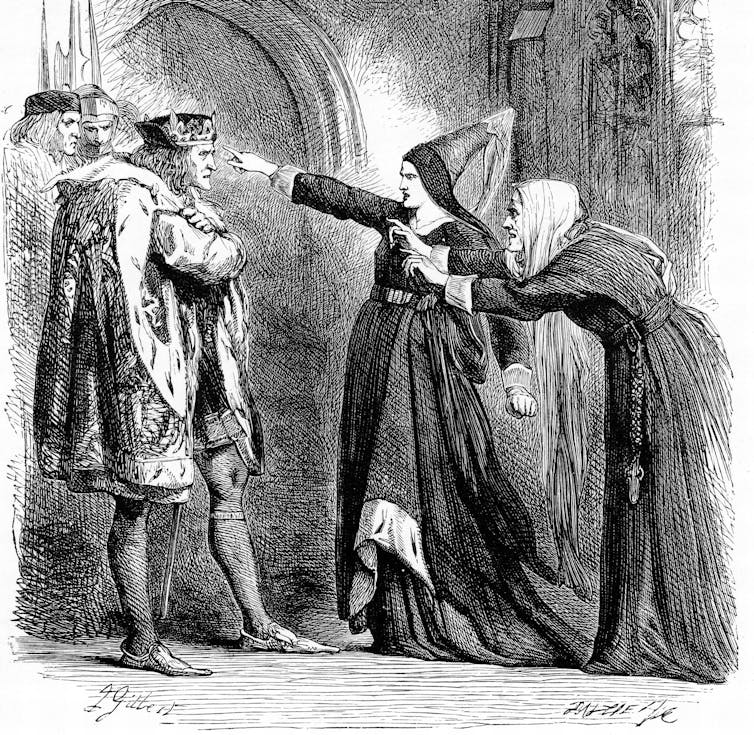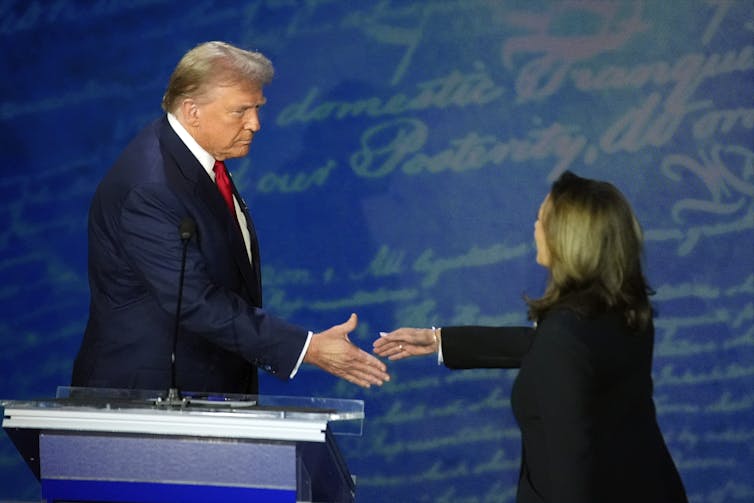Justice Department lawyers work for justice and the Constitution – not the White House
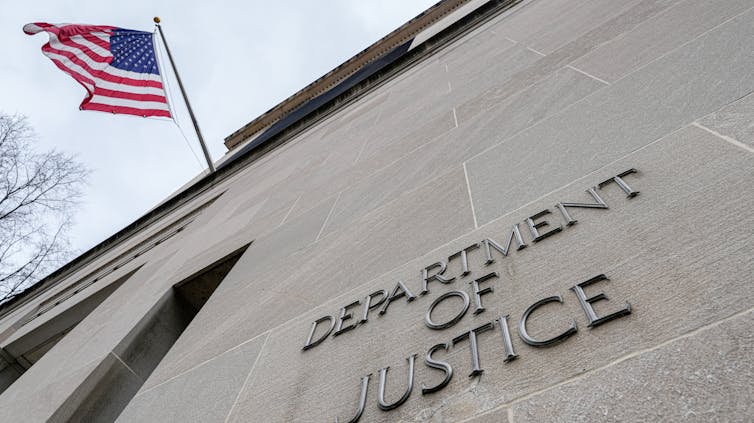
J. David Ake/Getty Images
Cassandra Burke Robertson, Case Western Reserve University
In the 1970s, President Richard Nixon tried to fire the Department of Justice prosecutor leading an investigation into the president’s involvement in wiretapping the Democratic National Committee’s headquarters.
Since then, the DOJ has generally been run as an impartial law enforcement agency, separated from the executive office and partisan politics.
Those guardrails are now being severely tested under the Trump administration.
In February 2025, seven DOJ attorneys resigned, rather than follow orders from Attorney General Pam Bondi to dismiss corruption charges against New York Mayor Eric Adams. Adams was indicted in September 2024, during the Biden administration, for alleged bribery and campaign finance violations.
One DOJ prosecutor, Hagan Scotten, wrote in his Feb. 15 resignation letter that while he held no negative views of the Trump administration, he believed the dismissal request violated DOJ’s ethical standards.
Among more than a dozen DOJ attorneys who have recently been terminated, the DOJ fired Erez Reuveni, acting deputy chief of the department’s Office of Immigration Litigation, on April 15. Reuveni lost his job for speaking honestly to the court about the facts of an immigration case, instead of following political directives from Bondi and other superiors.
Reuveni was terminated for acknowledging in court on April 14 that the Department of Homeland Security had made an “administrative error” in deporting Kilmar Abrego Garcia to El Salvador, against court orders. DOJ leadership placed Reuveni on leave the very next day.
Bondi defended the decision, arguing that Reuveni had failed to “vigorously advocate” for the administration’s position.
I’m a legal ethics scholar, and I know that as more DOJ lawyers face choices between following political directives and upholding their profession’s ethical standards, they confront a critical question: To whom do they ultimately owe their loyalty?
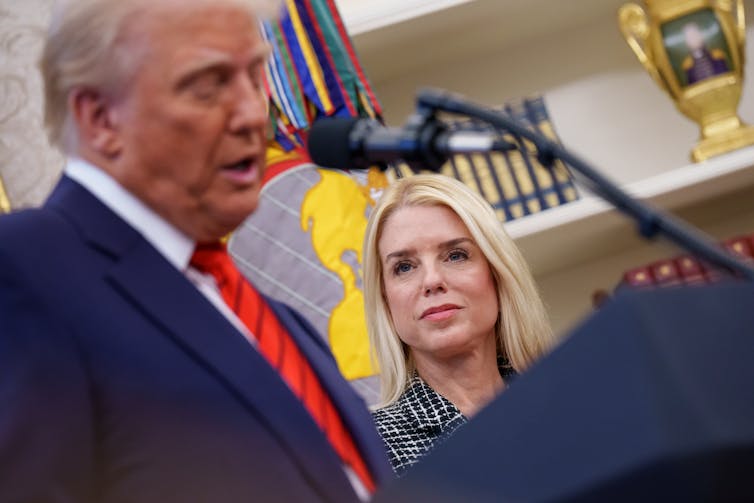
Andrew Harnik/Getty Images
Identifying the real client
All attorneys have core ethical obligations, including loyalty to clients, confidentiality and honesty to the courts. DOJ lawyers have additional professional obligations: They have a duty to seek justice, rather than merely win cases, as well as to protect constitutional rights even when inconvenient.
DOJ attorneys typically answer to multiple authorities, including the attorney general. But their highest loyalty belongs to the U.S. Constitution and justice itself.
The Supreme Court established in a 1935 case that DOJ attorneys have a special mission to ensure that “justice shall be done.”
DOJ attorneys reinforce their commitment to this mission by taking an oath to uphold the Constitution when they join the department. They also have training programs, internal guidelines and a long-standing institutional culture that emphasizes their unique responsibility to pursue justice, rather than simply win cases.
This creates a professional identity that goes beyond simply carrying out the wishes of political appointees.
Playing by stricter rules
All lawyers also follow special professional rules in order to receive and maintain a license to practice law. These professional rules are established by state bar associations and supreme courts as part of the state-based licensing system for attorneys.
But the more than 10,000 attorneys at the DOJ face even tougher standards.
The McDade Amendment, passed in 1998, requires federal government lawyers to follow both the ethics rules of the state where they are licensed to practice and federal regulations. This includes rules that prohibit DOJ attorneys from participating in cases where they have personal or political relationships with involved parties, for example.
This law also explicitly subjects federal prosecutors to state bar discipline. Such discipline could range from private reprimands to suspension or even permanent disbarment, effectively ending an attorney’s legal career.
This means DOJ lawyers might have to refuse a supervisor’s orders if those directives would violate professional conduct standards – even at the risk of their jobs.
This is what Assistant U.S. Attorney Danielle Sassoon wrote in a Feb. 12, 2025, letter to Bondi, explaining why she could not drop the charges against Adams. Sassoon instead resigned from her position at the DOJ.
“Because the law does not support a dismissal, and because I am confident that Adams has committed the crimes with which he is charged, I cannot agree to seek a dismissal driven by improper considerations … because I do not see any good-faith basis for the proposed position, I cannot make such arguments consistent with my duty of candor,” Sassoon wrote.
As DOJ’s own guidance states, attorneys “must satisfy themselves that their behavior comports with the applicable rules of professional conduct” regardless of what their bosses say.
Post-Watergate principles under pressure
The president nominates the attorney general, who must be confirmed by the U.S. Senate.
That can create the perception and even the reality that the attorney general is indebted to, and loyal to, the president. To counter that, Attorney General Griffin Bell, in 1978, spelled out three principles established after Watergate to maintain a deliberate separation between the White House and the Justice Department.
First, Bell called for procedures to prevent personal or partisan interests from influencing legal judgments.
Second, Bell said that public confidence in the department’s objectivity is essential to democracy, with DOJ serving as the “acknowledged guardian and keeper of the law.”
Third, these principles ultimately depend on DOJ lawyers committed to good judgment and integrity, even under intense political pressure. These principles apply to all employees throughout the department – including the attorney general.
Recent ethics tests
These principles face a stark test in the current political climate.
The March 2025 firing of Elizabeth Oyer, a career pardon attorney with the Justice Department, raises questions about the boundaries between political directives and professional obligations.
Oyer was fired by Bondi shortly after declining to recommend the restoration of gun rights to actor Mel Gibson, a known Donald Trump supporter. Gibson lost his gun rights after pleading no contest to a misdemeanor domestic battery charge in 2011.
Oyer initially expressed concern to her superiors about restoring Gibson’s gun rights without a sufficient background investigation, particularly given Gibson’s history of domestic violence.
When Oyer later agreed to testify before Congress in a hearing about the White House’s handling of the Justice Department, the administration initially planned to send armed U.S. Marshals officers to deliver a warning letter to her home, saying that she could not disclose records about firearms rights to lawmakers.
Oyer was away from home when she received an urgent alert that the marshals were en route to her home, where her teenage child was alone. Oyer’s attorney described this plan as “both unprecedented and completely inappropriate.”
Officials called off the marshals only after Oyer confirmed receipt of the letter via email.
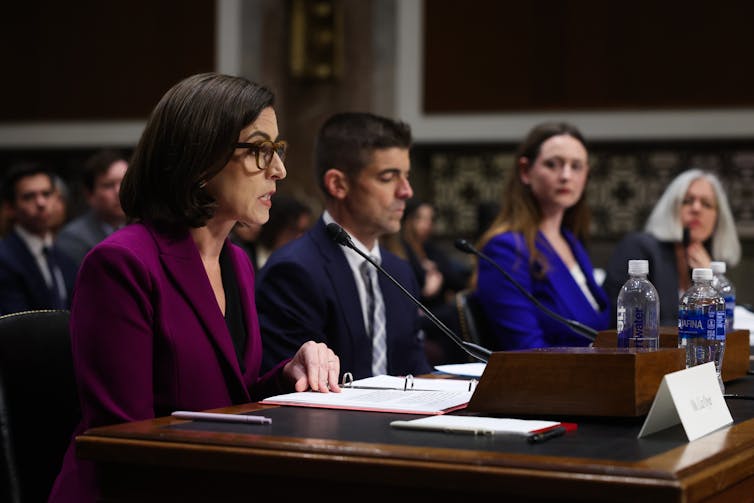
Kayla Bartkowski/Getty Images
Why independence matters
In my research, I found that lawyers sometimes have lapses in judgment because of the “partisan kinship,” conscious or not, they develop with clients. This partisan kinship can lead attorneys to overlook serious red flags that outsiders would easily spot.
When lawyers become too politically aligned with clients – or their superiors – their judgment suffers. They miss ethical problems and legal flaws that would otherwise be obvious. Professional distance allows attorneys to provide the highest quality legal counsel, even if that means saying “no” to powerful people.
That’s why DOJ attorneys sometimes make decisions that frustrate political objectives. When they refuse to target political opponents, when they won’t let allies off easily, or when they disclose information their superiors wanted hidden, they’re not being insubordinate.
They’re fulfilling their highest ethical duties to the Constitution and rule of law.![]()
Cassandra Burke Robertson, Professor of Law and Director of the Center for Professional Ethics, Case Western Reserve University
This article is republished from The Conversation under a Creative Commons license. Read the original article.
Continue reading “Reprint: Legal Ethics and the Constitution”…

